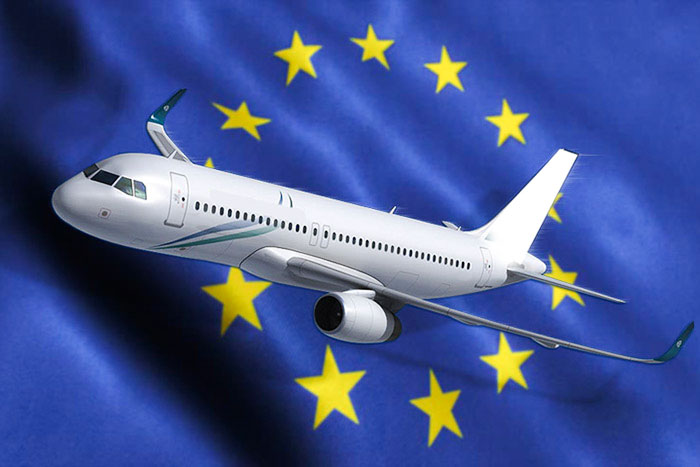Deloitte has issued a cautionary analysis suggesting that the European Union’s incoming mandates on sustainable aviation fuels (SAFs) may inadvertently weaken the financial viability of EU airlines. While the initiative aims to reduce carbon emissions and accelerate decarbonization, Deloitte warns that without phased implementation, airlines may face escalating costs that challenge competitiveness and operational stability.
According to Deloitte, as the EU pushes for graduated blending targets—requiring increasing percentages of SAFs be used in commercial flights—airlines will incur significantly higher fuel expenses. Unlike conventional jet fuel, SAFs typically cost two to three times more due to limited production scale, feedstock scarcity, and supply chain constraints. For EU carriers operating on tight margins, particularly low-cost and regional airlines, these cost differentials could squeeze profitability or force ticket price increases at the expense of demand.

Deloitte’s review points out that current SAF availability remains limited. Despite ambitious targets set for 2030 and beyond, production infrastructure has not yet caught up, leading to supply-demand imbalances. Without sufficient domestic or nearby supply, airlines may be forced to secure imported SAFs at premium costs, further exacerbating financial pressure in a highly competitive environment.
In addition to direct fuel cost concerns, Deloitte notes that compliance may burden airlines with the need for additional capital investments. Factors such as blending infrastructure upgrades, new storage facilities, certification processes, and auditing systems to track fuel mix compliance can impose further fixed expenses. Smaller carriers with limited balance sheets may struggle to fund such transitions, especially in the absence of targeted support or financing schemes.
Deloitte also cautions that unilateral EU mandates may disadvantage European carriers relative to global competitors. Airlines outside the EU may not face equivalent blending requirements or may access SAFs at lower prices in other jurisdictions, creating a competitive imbalance. This could prompt market share losses for EU carriers on international routes, fueling calls for coordination with trading partners to avoid cross-border distortions.
Nevertheless, Deloitte acknowledges the long-term environmental rationale behind SAF mandates. The report highlights that SAF adoption can potentially reduce lifecycle carbon emissions by up to 80 percent compared to traditional jet fuel. It underscores the importance of aligning policy with incentives, scale-up plans, and a fair transitional pathway to ensure airlines can comply without unrealistic financial burdens.
The consultancy recommends several mitigating strategies for policymakers and airlines alike. Key suggestions include: implementing cost-sharing frameworks such as blending mandates only upon reaching minimum price parity thresholds; offering subsidy programs or SAF credits to lower-cost producers; and extending timelines for actual compliance to allow gradual integration. Deloitte also advocates for public-private partnerships and renewable hydrogen incentives to support next-generation SAF technologies and drive down costs over time.
Airline executives and industry stakeholders have echoed some of Deloitte’s concerns. Leaders in the European Aviation Safety Agency (EASA) and the International Air Transport Association (IATA) have repeatedly urged for guardrails in policy design to ensure mandates do not destabilize airline balance sheets. They stress that overly aggressive blend targets—without supply guarantees or financial offsets—could depress capacity, force route cancellations, and erode passenger confidence if fares increase sharply.
Consumer advocacy groups are watching developments closely. While supportive of sustainability goals, they caution that excessive fuel cost pass-throughs to passengers could deter travel or shift demand toward non-EU carriers. Travelers on price-sensitive sectors, such as intra-European short haul and leisure routes, may feel such effects most acutely.
Deloitte also draws attention to downstream impacts throughout the aviation ecosystem. Air freight companies, airport operators, and aerospace suppliers may feel pressure if airlines retrench deployment or delay expansion plans due to rising input costs. Regional economies dependent on affordable air connectivity—such as tourism hubs and rural communities—could also face collateral effects.
On the positive side, Deloitte highlights the potential for domestic SAF industries to deliver broader economic benefits. Countries like Spain, France, and the Netherlands, which are investing in SAF production facilities and feedstock supply chains, stand to develop new green industrial sectors and create jobs. If carefully managed, this transition could simultaneously support environmental objectives and a more resilient European bioeconomy.
Looking ahead, Deloitte expects that the next two policy cycles will be defining for aviation decarbonization. The direction of EU budgets, SAF production pipeline announcements, and regulatory flexibility will determine whether blending mandates serve as a catalyst or a burden. The consultancy underlines that policy coherence—aligning fuel mandates with aviation safety, competition, and trade frameworks—is essential for holistic sustainability.
In summary, Deloitte’s advisory report warns that while the EU’s sustainable fuel mandates represent a critical step in reducing aviation emissions, they carry the risk of weakening European airlines unless implemented with economic safeguards. Higher fuel costs, infrastructure challenges, competitive inequities, and compliance burdens could jeopardize airline stability. For the initiative to succeed, policymakers must balance ambition with realism—providing sufficient incentives, phased timelines, and collaborative arrangements that allow airlines to transition sustainably without compromising service or financial health.
Support InfoStride News' Credible Journalism: Only credible journalism can guarantee a fair, accountable and transparent society, including democracy and government. It involves a lot of efforts and money. We need your support. Click here to Donate
